2018 Conference Speakers
 Ruta Abolins
Ruta Abolins
Ruta Abolins is the Head of the Brown Media Archives & Peabody Awards Collection which holds over 300,000 audiovisual items.. The archives is home to six local news collections in 16mm and tape formats representing Atlanta, Augusta, Savannah, Albany, and Columbus, Georgia. Ruta has an MA in Library and Information Studies from the University of Wisconsin and an MA in Popular Culture from Bowling Green State University.
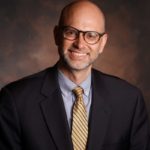 Clifford B. Anderson
Clifford B. Anderson
Clifford B. Anderson is Associate University Librarian for Research and Learning at the Vanderbilt University Library. He holds a secondary appointment as Professor of Religious Studies in the College of Arts & Science at Vanderbilt University and is affiliated faculty in the Comparative Media Analysis and Practice Joint-Ph.D. program. He is also an Adjunct Professor of Computer Science in the Department of Electrical Engineering and Computer Science in the Vanderbilt University School of Engineering.
Michael Angeletti
Michael Angeletti is the moving image digitization specialist at the Stanford Media Preservation Lab. In 2001, he began managing post-production for creative services boutiques in New York City, working to create broadcast graphics, commercials and programs for network and cable television. In 2007, he left video post-production to work as a media preservation vendor. He joined the Stanford Media Preservation Lab in 2010, where he continues to reformat moving image collections for the Stanford University Libraries. Michael holds a BA in Film & Media Studies from the University of Kansas. He lives in Palo Alto, California.
Julian Antos
Julian Antos is the Technical Director at the Music Box Theatre and the Executive Director of the Chicago Film Society. He also works as a freelance technician installing film loopers in museums and galleries, and has been an instructor and organizer of recent AMIA Archival Film Projection Workshops. He enjoys shooting 16mm film, especially of local wildlife and transportation.
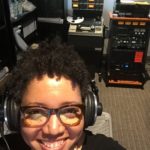 Ina Diane Archer
Ina Diane Archer
Ina Diane Archer is a Media Conservation and Digitization Assistant at The Smithsonian National Museum of African American History & Culture. She is a filmmaker and visual artist whose multimedia works and films have been shown nationally. Ina was a Studio Artist in the Whitney Independent Study program, a NYFA multidisciplinary Fellow, a 2005 Creative Capital grantee in film and video, and she has been awarded numerous residencies. Prior to joining NMAAHC, Ina was adjunct faculty at Parsons The New School for Design. She is the former co-chair of New York Women in Film and Television’s Women’s Film Preservation Fund. Ina earned a BFA in Film/Video from RISD and a Master’s in Cinema Studies at NYU focusing on race, preservation, early sound cinema and technology and she studied Moving Image Archiving and Preservation at UCLA (MIAS) and NYU (MIAP). Finally, Ina is a contributor to Film Comment Magazine, and she has written for periodicals Framework, Black Camera and she is juggling at least three blogs!
___________________________________________________________________________________________________________
Joy M. Banks
Joy M. Banks is a Program Officer at CLIR where she helps manage the Recordings at Risk and Digitizing Hidden Special Collections and Archives regranting programs. Prior to joining the CLIR grants team, she worked in library, archive, and museum settings in academic, public, and non-profit organizations focusing on cataloging, metadata creation, digitization, and special project management. She holds an MSLS from Clarion University of Pennsylvania and a BA in English from Florida Southern College.
 Susan Barrett
Susan Barrett
Susan Barrett is Director of Digital Repository Services for Arizona State University Library. Sue is a member of the AMIA Regional Audio Visual Archives committee, serves as a core design team member in Northeastern University’s Design 4 Diversity toolkit, and is the primary author of the DLF Cultural Assessment Selection Framework. She developed the Digital Moving Image Archives (DMIA) guide for independent and amateur filmmakers to provide basic information about preserving digital audiovisual productions. The DMIA is used in the curriculum at the L. Jeffrey Selznick School of Film Preservation at George Eastman House and is a Library of Congress National Film Board resource. Beginning her career in TV and radio broadcasting, Sue holds a BA in communication, an MAS in film studies, and an MLIS with a concentration in audiovisual archives.
 Snowden Becker
Snowden Becker
Snowden Becker is the MLIS Program Director at UCLA’s Department of Information Studies. She has been an AMIA member and conference attendee since 2001, participating in multiple committees and interest groups (Conference Program, Education, Publications, Small Gauge & Amateur Film, Scholarships) and serving as Secretary of the Board from 2013-2014. Her research interests focus on how audiovisual materials–especially nontheatrical media like home movies and bodycam footage–are integrated into our larger cultural heritage. ASK HER ABOUT: How to make the most of the AMIA conference, education and career options in media preservation, Home Movie Day, cats, knitting, food, and thrift-store shopping.
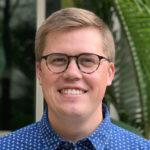 Brian Belak
Brian Belak
Brian Belak is the Collections Manager and Client Services Director at Chicago Film Archives, where he supervises the intake of all new collections, manages their processing and storage, and works with new filmmakers and researchers to provide access to the archive’s holdings. Brian joined the staff of CFA in 2015 and was previously a projectionist for Doc Films at the University of Chicago.
 Becca Bender
Becca Bender
Becca Bender is the Film Archivist and Curator of Recorded Media at the Rhode Island Historical Society. RIHS has a 9 million foot film collection that is largely comprised of local television news, a collecting area that is of particular interest to Becca. She is also the project archivist for the Leopold Godowsky, Jr. Collection, a recently uncovered home movie collection created by the co-inventor of Kodachrome film. Becca received an MA in Moving Image Archiving and Preservation from NYU in 2018, and as part of the program she completed projects at Lincolwn Center for the Performing Arts, The Bancroft Library at UC Berkeley, the California Audiovisual Preservation Project, and the archive of CUNY Television. Prior to MIAP, Becca worked for many years as a documentary archival producer.
Tre Berney
Tre Berney is the Director of Digitization and Conservation at Cornell University Library, overseeing the Audiovisual Preservation Lab, the Imaging and Scanning labs and the Conservation Lab. His foundational background is in audiovisual production, digitization, and preservation of collections and time-based media. Prior to his career in libraries, Tre worked in production, post, and preservation for cable television clients (Discovery, A&E, Biography, The History Channel), The Smithsonian Institution, The Howard Baker Center on Public Policy, The Highlander Center, and others. Tre holds BSCs in Journalism and Electronic Media from the University of Tennessee.
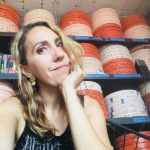 Viviana Garcia Besne
Viviana Garcia Besne
Viviana Garcia Besne is a fourth generation filmmaker, who has specialized in the history of Mexican Cinema over the past ten years. She founded Permanencia Voluntaria, an independent film archive with an eye for popular taste. She has become an outspoken proponent of preserving not just her family’s films, but also the classic, genre and popular films of Mexico which remain under-protected and largely unavailable, mostly un-preserved or un-restored. She is a tireless advocate and has become an important resource for professionals working in this area. In the past several years, she has moved some of the Archive’s more fragile nitrate prints and negatives from Mexico to UCLA. Seeking sidekicks to assist her in her battle, she has received grants and assistance from the Academy of Motion Picture Arts and Sciences for help in cataloging and protecting her collection. Viviana has also written several articles about the collection, her family’s legacy and the work of the archive and is completing a book on Azteca Films.
Viviana’s first film, Perdida, was part of the official selection at the prestigious Telluride Film Festival. Perdida has been screened at more than 30 international film festivals receiving several awards along the way. She was one of seven filmmakers invited to take part in the first edition of the Sundance Institute’s Documentary Edit and Story Lab. Her audiovisual work on the documentary Double Skin/Double Mind was selected as part of a temporary exhibition on video and dance, at the Centre Georges Pompidou in Paris.
 George Blood
George Blood
George Blood graduated from the University of Chicago (1983) with a Bachelor of Arts in Music Theory. He studied theory with Easley Blackwood (a private student of Nadia Boulanger), repertoire with Philip Gossett (Editor, critical editions of Verdi and Rossini for Casa Ricordi), Ellen Turner Harris (now retired Vice Provost at MIT), and analysis with Ralph Shapey and Shulamit Ran (Pulitzer Prize winning composers), among others. He is the only student of Canadian pianist Marc-André Hamelin.
Mr. Blood and his wife, Martha, have four daughters, one son, and five grandchildren. An unapologetic preservationist, Mr. Blood lives with his family in Philadelphia where he is renovating a 1768 house.
Jessica Bright
Jessica Bright is the Associate Librarian at the Revs Institute, a world-class automotive museum and library in Naples, Florida. In this position, she coordinates the Revs Digital Library (RDL), overseeing the processing of image collections, digitization, creation and review of original metadata, regular upload of content, preservation, and tracking of the RDL. She has a Master’s degree in Library and Information Science from SUNY University at Buffalo.
 Murray Browne
Murray Browne
Murray Browne is the manager of Turner’s Metadata Services team. Browne started at Turner over a decade ago as a metadata analyst and has been involved with content description during his entire tenure at the company. In addition to content description, the nine-person Metadata Services group maintains the Titles Database, Turner’s system of record for all its programming and handles closed captioning for the networks. Also within the Metadata Services’ purview is the development and maintenance of controlled vocabularies.
Before joining Turner, Browne was a researcher at the University of Tennessee’s Department of Computer Science and graduated with a Masters from their Information Sciences Department. He is the co-author of Understanding Search Engines, A Mathematical Approach (SIAM, 1999, 2005), author of a book of essays entitled The Book Shopper: A Life in Review (Paul Dry Books, 2009) and a work of fiction Down & Outbound: A Mass Transit Satire (Muted Horn, 2016). His professional website is murray-browne.com.
 Rosie Burgess
Rosie Burgess
Rosie Burgess is a recent graduate of the L. Jeffrey Selznick School of Preservation. She is Co-Founder and Co-Director of the British silent film organization South Wales Silents, steering group member of UK based film festival Cinema Rediscovered, and former Assistant Curator and Head of Digital Media at the archive comedy event Slapstick Festival. She recently completed an internship in the humanitarian organization CARE USA. Rosie is also a film historian, and her research interests include Silent Westerns, and the history of British Cinema and Pakistani Cinema. Rosie is passionate about advocating for and providing access to moving image history, and keeping this history alive for future generations.
______________________________________________________________________________________________________
 Jason Byrne
Jason Byrne
Jason Byrne is a filmmaker who has been strongly influenced by his background as an archivist. From 2008 to 2013, he worked as the audio-visual archivist for the United Nations Criminal Tribunal for Rwanda in Arusha, Tanzania. In 2010, he was named one of the “25 New Faces of Independent Film” by Filmmaker Magazine. After the UN, Byrne has been a fellow at various artist-in-residence programs, such as the Macdowell Colony, the Museum of Fine Arts, Houston (2014-16), and the Dora Maar House. He has also been an adjunct professor in film history at Rice University (2016). For the last few years, he has been mostly working on films relating to the audio-visual evidence and trials from the International Criminal Tribunal for Rwanda.
Savannah Campbell
Savannah Campbell is currently Media Preservation Specialist, Video and Digital Media at the Whitney Museum of American Art as part of the Museum’s Media Preservation Initiative project. She has previously been a Fellow in Magnetic Media Preservation at The Standby Program and a Video Digitization Specialist at the Dance Heritage Coalition, and has worked on audiovisual preservation projects for CUNY TV, Crawford Media Services, and the Wildlife Conservation Society. Savannah holds an MA in Moving Image Archiving and Preservation from New York University.
Michael Campos-Quinn
Michael Campos-Quinn is the Metadata & Digital Asset Manager at the Berkeley Art Museum and Pacific Film Archive, where his responsibilities include film and video cataloging, overseeing the image management system for the museum, helping to plan and manage digitization projects, and advocating for better living through metadata. Most recently he has designed and implemented a webapp to perform digital preservation tasks on AV material at BAMPFA, and enjoys finding low-barrier ways to automate our work as archivists. He holds an MLIS from San José State University and a BA in Film Studies from UC Berkeley.
 Mike Casey
Mike Casey
Mike Casey is the Director of Technical Operations for audio and video for Indiana University’s Media Digitization and Preservation Initiative, which has digitally preserved more than 300,000 audio and video recordings as of this writing. He is the co-author of Sound Directions: Best Practices for Audio Preservation, a contributing author to the second edition of the best practices publication Guidelines on the Production and Preservation of Digital Audio Objects (known as IASA-TC 04), a contributing author to IASA-TC 05 Handling and Storage of Audio and Video Carriers, the creator of FACET: The Field Audio Collection Evaluation Tool and the co-creator of the media prioritization software applications MediaSCORE and MediaRIVERS. He also authored the Indiana University Media Preservation Survey report and is principal author for the follow-up publication Meeting the Challenge of Media Preservation: Strategies and Solutions. His article entitled Why Media Preservation Can’t Wait: The Gathering Storm that explores media degradation and obsolescence was published in the IASA Journal in January 2015. Mike is currently adjunct faculty in the Department of Library and Information Science, School of Informatics and Computing, where he teaches a class in audio preservation.
 Tee Pao Chew
Tee Pao Chew
Tee Pao has been with the Asian Film Archive (AFA) since 2009. As Archivist, he oversees the development of the film collection, helps to plan the Archive’s preservation strategies and is also responsible for selecting and overseeing AFA’s film restorations. He has contributed articles on film preservation and co-written a chapter on “Independent digital filmmaking and its impact on film archiving in Singapore” for the book Singapore Cinema: New Perspectives.
 Kathryn Claypool
Kathryn Claypool
Kathryn Claypool is relatively new to the world of archiving and brings her experience migrating databases from legacy systems to updated web-based applications to one of the oldest studios in Hollywood. After getting her Master’s Degree in Epidemiology from Emory University, she focused on health related data for the Florida Department of Health, the Centers for Disease Control and Prevention, and Emory University Health Sciences until 2013. At Paramount Pictures, she has managed operations of the digital asset management system for distribution titles and is currently working with a team to migrate all physical asset metadata and inventory into the digital asset management system.
Brendan Coates
Brendan is the Sr. Archivist for Academy Oral History Projects. He manages the metadata work and data wrangling for the department, every part of the post-production workflow runs through him at some point, from transcription to access and licensing. Prior to this, he was the AV Digitization Technician at UCSB where he ran three preservation studios and contributed to their amazing cylinder website and the National Jukebox. He’s a two-time alum of the University of Michigan – getting an MSI from their School of Information and, prior to that, a BFA in Performing Arts Technology from their School of Music Theatre and Dance. In his free time he tries to keep his plants alive.
 Anne Coco
Anne Coco
Anne Coco is the Head of Graphic Arts Collections at the Academy of Motion Picture Arts and Sciences’ Margaret Herrick Library. She holds a bachelor’s degree in film studies from California State University, Northridge (CSUN) and a MLIS from the University of California Los Angeles (UCLA). Ms. Coco’s responsibilities include curating collections through donor relations and purchased acquisitions as well as managing the development of library-wide policies related to collection development and exhibition loans. In addition, Ms. Coco oversees a biennial international conference of librarians exploring topics the community faces in our increasingly digital world. In 1017, Ms. Coco was the co-author of “Documenting Cinema: The Evolution of the Film Librarian” in the October issue of Journal of Film Preservation.
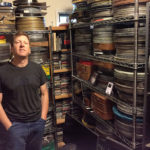 Peter Conheim
Peter Conheim
Peter Conheim is a film restorationist, collector and performer whose Cinema Preservation Alliance is dedicated to the rescue of independent and important features and shorts. He is the head archivist at byNWR.com, a free-to-view online project of film director Nicolas Winding Refn.
 Stéphanie Côté
Stéphanie Côté
Stéphanie Côté has been working at the Cinémathèque québécoise, a Canadian non-profit film archive, for nearly two decades, first as a Film Technician, then as a Film Cataloguer and Access Technician. She is now Archivist of the Cinema, Television and New Media Collections, since 2008. Film has been present in her life since early childhood. Her mother, a film editor who had her office in the family house, used to say she found her in a film bin. During her Film studies at the University of Montreal and at the Università degli Studi di Bologna in Italy, she worked on a few short films and collaborated with GRAFICS, a research group on early cinema. She attended the FIAF Summer School at the George Eastman House in 2002 and took part in many AMIA and FIAF conferences. She is also trained in film projection. She is a collaborator of the CINEMAexpo67 research group.
Matthew Cowan
Matthew Cowan has been the Archivist for Moving Images and Photography at the Oregon Historical Society since 2013. He is an adjunct professor in the Department of Theater + Film at Portland State University; is co-chair of the Multnomah County Cultural Coalition, and worked for many years at Anthology Film Archives in New York City. He has a BA in History and Film from Bard College, a certificate in Media Preservation from the George Eastman House, and an MLIS from Simmons College.
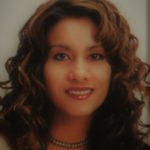 Evelyn Cox
Evelyn Cox
Evelyn Cox is a doctoral student at the University of Oklahoma where she obtained her MLIS as well as her Graduate Certificate in Archival Studies in 2018. She obtained her undergraduate degree in English from the University of California, Los Angeles and is a wife and mother of two. Evelyn is a retired English teacher with a background in assessment and curriculum development. She is also a 2016-2018 SAA Mosaic Program Fellow as well as a 2018 Public Broadcasting Preservation Fellow. Evelyn is interested in community archives, collective memory, language revitalization projects for indigenous communities, and documentation of oral tradition. She has a passion for oral history programs and community memory preservation as well as a strong commitment to the digitization of at-risk material.
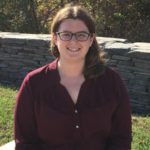 Rachel Curtis
Rachel Curtis
Rachel Curtis is a digital project specialist at the Library of Congress and serves as the Project Coordinator for the American Archive of Public Broadcasting. In this capacity, she manages the ingestion of preservation files and associated metadata into the Library’s archive, works with WGBH on policy and strategy, and coordinates Library staff on AAPB activities. Rachel holds a Master’s degree in Library and Information Science from the University of Wisconsin-Milwaukee.
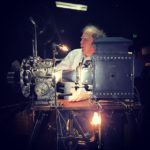 Chapin Cutler
Chapin Cutler
An avid movie buff, Chapin Cutler dreamed of bringing true craftsmanship to the world of film presentation. He trained as a projectionist while attending college at Worcester Tech. “I was hooked by the SHOW,” he says, “There’s something exhilarating about watching an audience react to a film and know that I made it happen for them.”
Chapin earned degrees from Emerson College and Wentworth Institute in film and related engineering fields. After a stint in film production and technical management at Emerson and WGBH-TV’s film department, he and his business partner Larry started Boston Light & Sound (BL&S), which has been a passion ever since.
 Rachel Del Gaudio
Rachel Del Gaudio
While attending Chapman University for a degree in Film Studies, Rachel spent each summer interning at film archives. Those lost summers paid off when she was offered a position at the Academy Film Archive in 2007 to work with their nitrate film collection, and then subsequently landed a job at the Library of Congress in their Motion Picture division in 2009. During her time at the Library, she has worked in the vaults, processed collections, inspected prints for film loans and has worked to barcode the vast collection. The most rewarding project has been co-creating and orchestrating “Mostly Lost,” the annual workshop that is dedicated to identifying unknown films from around the world. The workshop is an organic extension of the Flickr page that she created in 2008 as chair of the Association of Moving Image Archivists’ Nitrate Committee that serves the same purpose. Rachel has been chair of the Nitrate Committee since 2008 and a member of AMIA since 2002.
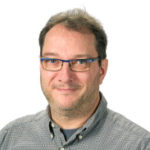 Erik Dix
Erik Dix
Erik Dix is the Archivist for Audio-Visual Materials at the Archives of the University Of Notre Dame. He is responsible for the preservation, cataloging, and digitization of these materials as well as for handling all research and reference requests in regards to A-V materials. He received a master’s degree in Economic History, Political Sciences, and Media Sciences from the Heinrich-Heine University in Düsseldorf, Germany.
Laura Drake
Laura Drake Davis is a Digital Specialist at the Library of Congress in the Moving Image Section. In this role, Laura processes born-digital moving image content, develops new workflows for born-digital content and develops strategies for metadata capture and transformation. Laura brings a wide range of experience to this role, with previous positions in college and university archives, special collections, and state government archives. A certified archivist since 2007, Laura holds the Master of Library Science degree from the University of Maryland College Park.
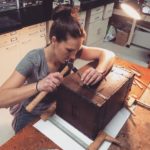 Sophie du Bois Hunter
Sophie du Bois Hunter
Sophie is an Objects Conservator for the Academy Museum of Motion Pictures in Los Angeles, CA. Prior to her position there, she worked at various other Museums, including the Smithsonian National Museum of African American History and Culture, the State Museums and Monuments of New Mexico, the Autry Center of the American West and George Washington’s Mount Vernon Estate. She has done work abroad in Luxor, Egypt and Guadalajara, Mexico. Sophie holds a M.A., C.A.S. in Art Conservation from SUNY Buffalo State College and a B.A. in U.S. History from the University of Chicago.
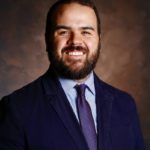 Jim Duran
Jim Duran
Jim Duran is the Curator of Born-Digital Collections at the Vanderbilt University Library. He is a manager of the Vanderbilt Television News Archive and has a background in audiovisual and born-digital archives from his work at Boise State University Library, Special Collections and Archives.
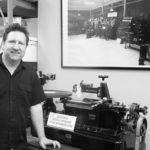 Dino Everett
Dino Everett
Dino Everett was a teenage projectionist at a Drive-In in the 1970’s before spending most of his life as a touring punk rock musician. He ultimately got a real job at the UCLA Film & Television Archive and now runs the USC Hugh M. Hefner Moving Image Archive. The University of Indiana dubbed him the punk rock archivist. He has published and presented articles both on the history and technology of the moving image field, and actively supports both the amateur’s role in the history of cinema archiving and the safe use of archival originals.
Stacey Doyle Ference
Stacey Doyle Ference is a Specialist in the Special Formats Processing division of the New York Public Library. She received her dual Masters of Library and Information Science from Indiana University in 2012. During that time, and for two years after, she was an assistant archivist at the university’s Black Film Center/Archive. From 2014-2016 she was a project archivist at George Eastman Museum, working on a Council on Library and Information Resources grant for hidden collections; it involved processing the paper collections of four American independent filmmakers.
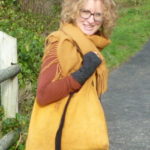 Karianne Fiorini
Karianne Fiorini
Karianne Fiorini is an independent film archivist and curator. Since 2003 she has organized numerous different home movie projects and has been a frequent contributor to international meetings and symposia, including the AMIA Conference (Rochester 2007, Philadelphia 2010, Portland 2015) the Home Movie Summit (Culpeper 2010), Euscreen Conference (Rome, 2010), Film im Handtaschenformat (Frankfurt am Main 2010, 2011, 2015), 23° Rencontres européennes d’INEDITS (Bologna 2011, Paris 2013), Der klingende Amateurfilm (Bern, 2017), Genealogie per immagini, I film di famiglia da rito collettivo a laboratorio di memorie, ICAR-MiBACT (Rome, 2017), Documentalia – Il cinema in rete, Archivissima Festival (Torino, 2018). She is one of the founders of the Archivio Nazionale del Film di Famiglia (Bologna, IT), where she was manager of Film Collections and Cataloguing for twelve years between 2003 and 2015 and curator since 2004 of both Home Movie Day and UNESCO World Day for Audiovisual Heritage events. She is currently collaborating with the Chicago Film Archives for the International Media Mixer 2018 project, running a national survey on home movie archives in Italy with the Istituto Centrale per gli archivi – ICAR/MiBAC, and co-curating an Italian educational project called Re-framing home movies / Residenze in archivio (2017) and Re-framing home movies / L’eredità ritrovata (2018) (www.reframinghomemovies.it (http://www.reframinghomemovies.it/)). In the past few years she has also worked on a “catalogue raisonné” of the work of the German filmmaker Helga Fanderl (the first output of the project (http://www.helgafanderl.com (http://www.helgafanderl.com/)), and has curated film programs for the Mostra Internazionale del Nuovo Cinema di Pesaro.
 Meghan Fitzgerald
Meghan Fitzgerald
For eight years, Meghan brought her background in library and information science to the media and entertainment industry, developing data models, metadata schemas, controlled vocabularies, and digital archives as a Media Content Analyst at Turner Broadcasting and a Manager of Metadata & Asset Management in the HBO Archive. In 2016, she became the metadata librarian and taxonomist for the Earth Observatory group at NASA Goddard Space Flight Center in Maryland, spearheading the Earth Science Communications Content Registry (ESCCOR) project for NASA’s Earth Science Division. ESCCOR is a comprehensive catalog of Earth Science multimedia content across NASA’s web platforms. Meghan created and now manages this content registry, and has adapted NASA’s Global Change Master Directory (GCMD) for use as an ontology that provides data models and controlled terms for ESCCOR. She holds an MLS from the University of North Carolina’s School of Information and Library Science in Chapel Hill.
Meghan is also a freelance writer and game developer for Onyx Path Publishing and other tabletop game companies. She is the developer for Changeling: The Lost and has worked on over 40 books for various game lines.
 Dylan Flesch
Dylan Flesch
Dylan Flesch is the Media Asset Librarian at KEXP, a nonprofit arts organization based in Seattle that serves music lovers through in-person, broadcast and online programming. He is responsible for the direction, operation and management of the KEXP Media Library and Archives. He is passionate about providing access to history through the preservation of recorded sounds and moving images. He received a master’s degree in Library and Information Science from the University of Washington, and currently lives in Brooklyn, New York.
 Tone Føreland
Tone Føreland
Tone Føreland is a film archivist at the National Library of Norway, currently undertaking a PhD research project on Norwegian agricultural films at Inland Norway University of Applied sciences, Campus Lillehammer. She holds an MA in film studies from Norwegian University of Science and Technology, Trondheim and is a 2005-alumni of the certificate program at the L. Jefferey Selznick School of Film Preservation.
 Giovanna Fossati
Giovanna Fossati
Giovanna Fossati is the Chief Curator of Eye Filmmuseum (Amsterdam) where she supervises a collection of 50,000 titles. She is also Professor of Film Heritage and Digital Film Culture at the University of Amsterdam where she has taught in the MA Preservation and Presentation of the Moving Image Program since it was established, in 2003. She is currently leading the research project The Sensory Moving Image Archive (SEMIA). Boosting Creative Reuse for Artistic Practice and Research. With Eef Masson, she also coordinates the research group Moving Images: Preservation, Curation, Exhibition (ASCA). Fossati is the author of From Grain to Pixel: The Archival Life of Film in Transition (Amsterdam University Press, 2009 and 2011), co-author with Tom Gunning, Joshua Yumibe and Jonathon Rosen of Fantasia of Color in Early Cinema (Amsterdam University Press, 2015), co-editor with Annie van den Oever of Exposing the Film Apparatus. The Film Archive as a Research Laboratory (Amsterdam University Press, 2016), and co-editor of the volume The Colour Fantastic. Chromatic Worlds of Silent Cinema (Amsterdam University Press, 2018). The revised version of her book From Grain to Pixel will be published in October 2018.
 Adam Foster
Adam Foster
Adam Foster is the Head Archivist for the Bob Baker Marionette Theater and a graduate student in UCLA’s MLIS Media Archival Studies program. His studies and research focus on the conservation and preservation challenges of community-based archives. He is specifically interested in the application of creative and affordable tools that enhance the life of these collections. This extends to his graduate portfolio research, which examines how recent lighting techniques used to restore color faded museum objects can be applied to the exhibition of color faded film collections. He holds a B.A. in Film and Digital Media Production from the University of California, Santa Cruz. Adam previously worked in entertainment as a professional video editor and was the host and showrunner for the children’s puppet show Looking for Animals on public access television. He has held mentorships at Canyon Cinema and the Niles Essanay Silent Film Museum, and internships at 20th Century Fox Archives and the UCLA Film & Television Archive.
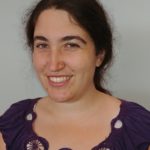 Rebecca Fraimow
Rebecca Fraimow
Rebecca Fraimow is the Digital Ingest Manager at the WGBH Media Library and Archives and the American Archive of Public Broadcasting, where she oversees digital archiving workflows, the Public Broadcasting Preservation Fellowship program, and the development of the PBCore metadata standard. Rebecca was a founding member of New York City’s XFR Collective, a nonprofit organization supporting the preservation of at-risk audiovisual media, and previously managed the Dance Heritage Coalition’s NYC Digitization Hub.
 Ashley Franks-McGill
Ashley Franks-McGill
Ashley Franks-McGill is an emerging Collections Management professional currently volunteering with the Internet Archive to digitize and make their film collections available to the public. Ashley firmly believes that there is no preservation without access.
Ashley has supported processing archival collections in a wide range of organizations – from personal collections and historical societies to Oddball Films and the critically-acclaimed Pixar Animation Studios.
Ashley was recently awarded the Ted Greenberg Award for Excellence in Collections Management for her Master’s Project entitled Saving Celluloid: Strategic Planning for Unmanaged Film Collections in Small Libraries, Archives and Museums.
Ashley holds dual Master’s degrees in Museum Studies and Business Administration from John F. Kennedy University and a Bachelor’s degree in American Studies from California State University Fullerton.
 Nancy Friedland
Nancy Friedland
Nancy Friedland is the Librarian for Film Studies and Performing Arts at Columbia University. She currently serves as past president for the Theatre Library Association. She served as editor and contributor to Documenting Costume Design (2010). She most recently served on the planning committee for the Alliance of Digital Humanities Organizations (ADHO) Conference (2018) and has presented and written on various topics related to research for the performing arts and film studies.
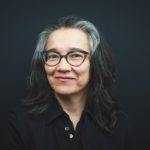 Monika Kin Gagnon
Monika Kin Gagnon
Monika Kin Gagnon is Professor of Communication Studies at Concordia University, Montreal. She is author of Other Conundrums: Race, Culture and Canadian Art (2000), 13 Conversations about Art and Cultural Race Politics (2002) with Richard Fung, and is co-editor of Reimagining Cinema: Film at Expo 67 with Janine Marchessault (2014). She was co-curator of In Search of Expo 67 at the Musée d’art contemporain de Montréal for the 50th anniversary of Expo 67, including an expanded cinema program of digitally restored multi-screen films from Expo 67, including Motion (1967) and The Earth is Man’s Home (1967). She curated La Vie polaire/Polar Life in 2014, a digital simulation of the 11-screen Expo 67 film, which partnered the Cinémathèque québécoise and National Film Board of Canada with CINEMAExpo67.
 Anne Gant
Anne Gant
Anne is Head of Film Conservation and Digital Access at Eye Filmmuseum in Amsterdam. The department has grown to include the intake and ingest of born digital material, digitization of the film collection, restoration (photochemical and digital), digital access and archival sales. She has an MA in Preservation and Presentation of the Moving Image from the University of Amsterdam, and is a member of the FIAF Technical Commission. She previously worked in New York for a mix of digital, film and cultural heritage organizations, including an early digitization project of photos at the Brooklyn Historical Society and as the administrative manager for Women Make Movies.
________________________________________________________________________
 Nick Gold
Nick Gold
Nick Gold is the Lead Technologist for Chesapeake Systems, an East Coast-based IT-centric media systems integrator. Chesapeake Systems specializes in working with large media entities to design, install and maintain video post-production, archive, media asset management, storage, ingest/playout and program delivery systems. Gold brings to his consultant role an extensive technical knowledge base. His intense curiosity drives him to stay current with the latest developments in the media & IT fields. Complementing that is his uncanny ability to communicate complex technical concepts to the layperson and is recognized as a leading expert within the realm of Media Asset Management (MAM) and related archive & storage workflows. Within the past year, Gold has moderated three New York City-based symposia concerning MAM, and he presented a MAM primer to SMPTE DC’s “Bits By The Bay” conference. Gold is also co-host of the popular audio podcast series, The Workflow Show, now in its third season. The episodes address overarching trends and specific tech topics to help guide listeners through these challenging yet exciting times of unprecedented change within the realm of digital media workflows.
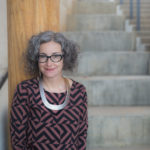 Marsha Gordon
Marsha Gordon
Marsha Gordon is Professor of Film Studies at North Carolina State University. She is the author of Film is Like a Battleground: Sam Fuller’s War Movies (2017) and Hollywood Ambitions: Celebrity in the Movie Age (2008), and co-editor of Learning With the Lights Off: Educational Film in the United States (2012). She is the former co-editor of The Moving Image (University of Minnesota Press), the journal of the Association of Moving Image Archivists, and has just completed a new co- edited (with Dr. Allyson Nadia Field) collection, Screening Race in American Nontheatrical Film for Duke University Press, which will be published in 2019.
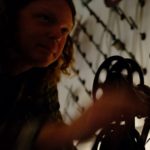 Paul Gordon
Paul Gordon
Paul Gordon is a Senior Film Conservator at Library and Archives Canada. For the past 10 years he has been working on the analog and digital preservation of LAC’s motion picture film collection. Paul is a graduate of Ryerson University’s Image Arts Program, Film Production stream. He also worked at Western Arctic Motion Pictures and Saw Video both non-profit film and video co-ops. In the past he has been a Film Projectionist and Independent Film Producer. Recently he collaborated with filmmaker Bill Morrison on Dawson City: Frozen Time. Library and Archives Canada houses over 100,000 film and video titles in the Gatineau Preservation Centre in Gatineau, Quebec and at the Nitrate vaults at Shirley’s Bay in Ottawa.
 Michael Grant
Michael Grant
Michael Grant is a Media Preservation Associate at NYU Libraries, a Magnetic Media Fellow at the Standby Program, and a member of XFR Collective. He has done work for the New York State Archives, the Educational Video Center, and La MaMa E.T.C., and is a graduate of NYU’s MIAP program. When he’s not working in archives, he does props for stage musicals in NYC.
 Megan Gruchow
Megan Gruchow
Megan Gruchow is an Archivist at NBCUniversal Archives & Collections where she manages the feature film and theme park collections. Her responsibilities include the acquisition and cataloging of costumes, props, continuity, photography, art department materials, and other related assets. Megan also coordinates the loan of these archival assets for internal productions, marketing events, and external exhibitions. She holds a Bachelor of Arts degree in film studies from Chapman University and a Master of Arts degree in moving image archive studies from the University of California, Los Angeles. Prior to her work at NBCUniversal, Megan served as a production art cataloger at the Academy of Motion Picture Arts and Sciences’ Margaret Herrick Library.
 Siobhan C. Hagan
Siobhan C. Hagan
Siobhan C. Hagan holds her M.A. in Moving Image Archiving and Preservation (MIAP) from NYU’s Tisch School of the Arts. She has worked in a variety of collecting organizations throughout her career, including the UCLA Library, the National Aquarium, and the Smithsonian Institute. She is currently the Project Manager of the Memory Lab Network at the DC Public Library. Siobhan is also the founder, CEO, and President of MARMIA (the Mid-Atlantic Regional Moving Image Archive). She has been active as a member of the Association of Moving Image Archivists (AMIA): she is currently co-chair of the Local TV Task Force, was a chair of the Regional Audio-Visual Archives Committee from 2013-2018, and was an AMIA Director of the Board from 2015-2017.
Rebecca Hall
Rebecca Hall is the Director of Operations at the Chicago Film Society, a nonprofit organization that supports and advocates for the exhibition of analog film prints through public screenings and professional support initiatives, including Sprocket School (a repository for best practices for analog film projectionists) and the Summer 2018 AMIA Projection Workshop. She has worked as a projectionist at the University of Chicago Film Studies Center, the Music Box Theatre, the Wisconsin Film Festival, and the Gene Siskel Film Center at the School of the Art Institute of Chicago and has been involved with the technical side of AMIA’s Archival Screening Night since 2013.
Dinah Handel
Dinah Handel is the Digitization Services Manager at Stanford University, where she works across their digitization labs to provide quality services to Stanford University patrons and the community at large. Previously, she was the Mass Digitization Coordinator at the New York Public Library, and was a member of the 2015-2016 NDSR-NY cohort, as a resident at CUNY TV. She has also worked on community archives projects in New York and San Francisco. She holds an MLIS from Pratt Institute in New York, and a BA from Hampshire College.
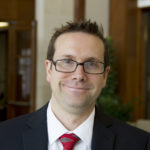 Ben Harry
Ben Harry
Ben Harry is a graduate of the UCLA MIAS program in 2006. He was the Media Archivist at the National Baseball Hall of Fame in Cooperstown, NY (2006-2009). Worked in the Recorded Sound Division of the Library of Congress at the NAVCC in Culpeper, VA (2009-2015). Ben worked in AV preservation for the history library of the Church of Jesus Christ of Latter-day Saints (2015-2018). Just this April he was named as the Curator of Audiovisual Materials and Media Arts History at BYU’s Special Collections. So he can now add manuscript curator to his AV background. He still goes by Benji.
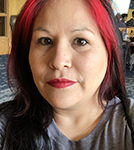 Jen Hart
Jen Hart
Jen Hart has been the Library Technician in the Medweganoonind Library at the Red Lake Nation College for the past 3 years. She is an enrolled tribal member of the Red Lake Band. The Medweganoonind Library is the library for both Red Lake Nation College and the Red Lake community. The Red Lake Nation College (RLNC) was chartered by the Red Lake Band of Chippewa Indians in 2001 to provide higher education opportunities for Tribal members living on and near the Red Lake reservation. The library houses books for both academic and recreational purposes, a small reference collection, a growing collection of media items such as audio books and DVDs, and an Ojibwe Language and Culture collection. In order to address the needs of the Red Lake Nation community, the library makes a special effort to create programming and collect all materials relating to the Red Lake community, including history, culture, and language. The library motto is “We live in the college; we serve the community”.
Genevieve Havemeyer-King
Genevieve Havemeyer-King is the Media Preservation Coordinator for the New York Public Library’s Audio and Moving Image Preservation department and former National Digital Stewardship Resident at the Wildlife Conservation Society. She has been a freelance film projectionist in New York City since 2011 and joined the AMIA Projection and Technical Presentation Committee as Co-Chair in 2017.
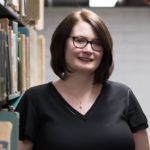 Laura Haygood
Laura Haygood
Laura Haygood is a graduate student in the University of Oklahoma’s MLIS Program. She holds a Bachelor of Arts in History, and plans to complete her MLIS in May. She works as a Graduate Research Assistant in the Digitization Lab at OU’s Bizzell Memorial Library, where she formerly worked in the Government Documents Collection. Laura was a 2018 Public Broadcasting Preservation Fellow, which fostered in her a desire to preserve moving images and increase access to them. Additionally, she serves on the Ethics Committee of the Oklahoma Library Association and has volunteered her time at the Moore-Lindsay Historical House Museum, where she wrote an NEH Preservation Assistance Grant.
 Alicia Hickman
Alicia Hickman
Alicia Hickman is the Film Preparations and Returns Manager at the Indiana University Libraries Moving Image Archive. The Moving Image Archive is home to one of the largest collections of education films, many of which are currently being digitized through the Media Digitization Preservation Initiative (MDPI). At the Moving Image Archive, Alicia manages day-to-day logistics to ensure best practices relating to of the physical care, handling, and conservation of films digitized through MDPI. Prior to this, she worked as a student helping to manage the preparation of video and disc formats for MDPI. She received her Masters of Library Science in 2017 from Indiana University and holds a Masters of Theological Studies from Vanderbilt University.
 Erica J. Hill
Erica J. Hill
Erica J. Hill is a New England-based filmmaker and archivist. After completing her internship at the Harvard Film Conservation Center in August 2018, she received a masters degree in Library and Information Science with a concentration in Archives Management from Simmons College. She received a Bachelor’s degree in Film Production from Emerson College in 2011 and later interned at Anthology Film Archives in New York City. She is currently wearing many hats at Zipporah Films, Inc in Cambridge, Massachusetts where she is the film technician and production assistant for Frederick Wiseman. Her passions include experimental film, making zines, and vegan baking.
 Kelli Hix
Kelli Hix
Kelli Hix is an independent audiovisual archivist. Her current projects include audiovisual archivist at the Nashville Metro Archives Audiovisual Conservation Center (a regional archive in Tennessee); member of the Community Archiving Collective performing the Audiovisual Preservation Readiness Assessment project at the Smithsonian Institution, and regional mentor for the Southeastern United States on the Community Archiving Workshop Training of Trainers program.
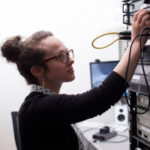 Libby Savage Hopfauf
Libby Savage Hopfauf
Libby Savage Hopfauf is the Program Manager/Audiovisual Archivist at Moving Image Preservation of Puget Sound (MIPoPS) and Project Audiovisual Archivist at Seattle Municipal Archives (SMA) in Seattle, Washington. She received a Master’s in Library and Information Science from the University of Washington and a Bachelor of the Arts in Creative Writing with a minor in Sociology from Western Washington University. She is passionate about creating resources that provide intuitive use of open-source tools, making the digitizing process accessible to archivists (with a wide variety of skill-levels) to ensure the sustainability of institutions to preserve their videotape and conquer the magnetic media crisis.
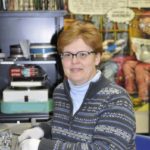 Mary Huelsbeck
Mary Huelsbeck
Mary Huelsbeck has been the Assistant Director of the Wisconsin Center for Film and Theater Research at the University of Wisconsin-Madison since March 2012. She has twenty years of experience managing film, videotape, audio, photograph, manuscript and three dimensional object collections and has worked in museums, libraries and archives. Her undergraduate degrees in History and Political Science are from Carroll College in Waukesha and she holds Masters in History and Library Science from the University of Wisconsin-Milwaukee.
 Dawn Jaros
Dawn Jaros
Dawn Jaros is the Head of Library Conservation at the Academy of Motion Picture Arts and Sciences (AMPAS), Margaret Herrick Library where she oversees all preservation and conservation activities for the Library’s collection departments. Previously, Ms. Jaros held positions at the Art Institute of Chicago (AIC) in the Prints and Drawings department in Chicago, IL.; the Balboa Art Conservation Center in San Diego, CA.; the National Archives and Records Administration in College Park, MD; the Denver Art Museum, Denver Museum of Nature and Science and the Western Center for the Conservation of Fine Art, all in Denver, CO. In addition to her work at MHL, Ms. Jaros currently does private work for smaller cultural and corporate institutions as well as private clients in the greater LA area. Ms. Jaros completed her graduate studies at Buffalo State College with an M.A. in Art Conservation and Certificate of Advanced Study in Paper Conservation in 2008. She has been a member of the American Institute for Conservation of Historic and Artistic Works organization since 2004 and became a Professional Associate within the AIC organization in 2013. Ms. Jaros is a Los Angeles Preservation Network (LAPNet) Steering Committee member since 2014 and currently hold the position of Secretary of the committee.
 Nikki Jee
Nikki Jee
Nikki Jee has worked in the Paramount Archives as Manager of Preservation for the past six years. In her role, she has preserved over 250 titles from the Paramount and Republic libraries, including Paramount’s first feature film, Queen Elizabeth. Recent 4K restoration projects include TRUE GRIT (1969) and IT’S A WONDERFUL LIFE (1946). Nikki is a graduate of UC Irvine with a B.A. in English with a double minor in Film and Media Studies and Digital Arts.
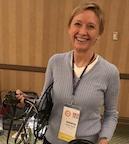 Jennifer L. Jenkins
Jennifer L. Jenkins
Jennifer Jenkins teaches film, literature, and archival studies at the University of Arizona. She is PI on a three-year NEH-funded project to repatriate mid-century educational and industrial films about U.S. Native peoples through new narrations and descriptive metadata from within Native communities, a process termed Tribesourcing.
 Lizzy Jongma
Lizzy Jongma
Lizzy Jongma (1970) is Senior ICT project manager for the Dutch Network for War Collections WWII (NOB), a national network of heritage Institutions and portal site containing over 10+ million WWII related digital objects and a biographical site containing resources about approx. 300.000 people. The NOB also works on Linked Open Data, Digital Research Tools, Innovation in Access to Digital Resources, Crowd Sourcing and the NOB hosts a CKAN open data repository for war resources.
Before this, Lizzy worked at the Rijksmuseum Amsterdam as Data Manager (2011-2016). She worked on Open Access to the Rijksmuseum collections. Resulting in the Rijksmuseum API, Rijksmuseum Public Domain Collections and Rijksstudio.
Lizzy is member of the Europeana Member Council and frequently speaks about the importance of Open Data and Open Access.
 Blanche Joslin
Blanche Joslin
Blanche Joslin is the Moving Image Archiving and Preservation Technician for NYU’s MIAP Master’s program. She completed her MA in Film + Photography Preservation and Collections Management at Ryerson University in Toronto, Ontario. Before joining the audiovisual archiving profession she was as a Head Broadcast Technician with Royal Caribbean Cruise Lines.
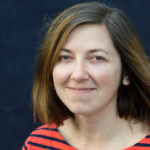 Casey Davis Kaufman
Casey Davis Kaufman
Casey Davis Kaufman (she/hers/hers) is Associate Director for WGBH’s Media Library and Archives and Project Manager for the American Archive of Public Broadcasting. Her interests include access, use of archives, copyright, advocacy, and supporting non-AV-trained archivists in developing AV expertise. She’s worked for American Experience, DearTomorrow, and holds an MLIS from LSU. She currently serves on the Board for AMIA.
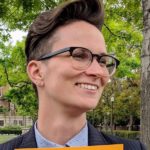 Anne Marie Kelly
Anne Marie Kelly
Anne Marie Kelly is a Project Specialist at the USC Shoah Foundation. She is a recent graduate with her Masters in Cinema & Media Studies from USC with publications in The Cine-Files and Spectator. Anne previously worked in film sound restoration for Deluxe Entertainment and consulted at the Academy of Motion Picture Arts and Sciences Oral History Projects.
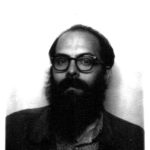 John Klacsmann
John Klacsmann
John Klacsmann is Archivist at Anthology Film Archives in New York City where he preserves experimental film and artists’ cinema. Before joining Anthology in 2012, he worked as a preservation specialist and optical printing technician at Colorlab, a film laboratory in Maryland. He is a contributing editor to INCITE: Journal of Experimental Media.
 Reto Kromer
Reto Kromer
Having graduated in mathematics and computer science, Reto Kromer became involved in audio-visual conservation and restoration more than thirty years ago. He was head of preservation at the Cinémathèque suisse (Swiss National Film Archive), and lecturer at the University of Lausanne and the Academy of Fine Arts, Vienna. He has been running his own preservation company, AV Preservation by reto.ch, and lecturing at the Bern University of Applied Sciences. His current research includes colour spaces, look-up tables and codec programming and emulation. He was a director of the board for the Association of Moving Image Archivists (AMIA) during two terms.
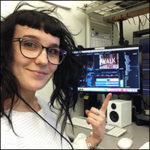 Ari Lavigne
Ari Lavigne
Ari Lavigne is the Assistant Audiovisual Archivist and Metadata Specialist at MIPoPS. She also manages MIPoPS’ social media and marketing. She received her MLIS from the University of Washington in 2018, where her interests centered on bringing special collections out of the reading room and into communities. Ari revels in the variety of her work at MIPoPS – from the technical aspects, the research, training volunteers, working on the screenings – she enjoys it all! Outside of work she spends her time and energy putting more love into the world.
 Sonja Wong Leaon
Sonja Wong Leaon
Sonja Wong Leaon is the Director of Registration and Collection Management for the Academy Museum of Motion Pictures, a film history museum currently being constructed in Los Angeles. Sonja has worked at the Academy for the last five years where she oversees all registration and preservation activities for the Museum’s collection. She has fifteen years of experience with collections ranging from rare books to film costumes at the Bowers Museum, a private art collection, and the Getty Research Institute. Sonja holds an M.A. in Visual Culture, Costume Studies from NYU and a B.A. in Architecture from Wellesley College.
 Andrea Leigh
Andrea Leigh
Andrea Leigh is the Moving Image Processing Unit Head at the Library of Congress National Audio Visual Conservation Center where she participates in strategic initiatives, personnel management, and metadata design and implementation. Previously, she was a cataloger and metadata librarian at the UCLA Film and Television Archive.
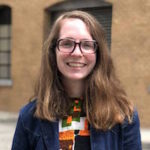 Trisha Lendo
Trisha Lendo
Trisha Lendo is a Senior Digital Media Archivist at Paramount Pictures where she enjoys working with their vast collection. She is a 2010 graduate of the UCLA Moving Image Archive Program and also worked at the UCLA Film & Television Archive after she graduated. Trisha is an active volunteer in Home Movie Day and at the Mayme A. Clayton Library and Museum. In 2017, Trisha was happy to join the Motion Picture Editor’s guild as a Media Archivist. This is Trisha’s 4th AMIA conference and she is always happy to find and share orphaned material, leader ladies, or cute dog clips that she finds in the collections she works with.
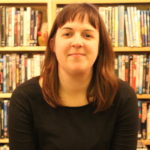 Kristin Lipska
Kristin Lipska
Kristin Lipska is the Digital and Media Archives Coordinator at the San Francisco Symphony. Previously she worked as Project Coordinator at the California Audiovisual Preservation Project (CAVPP), maintaining the digitization workflow, and ensuring the quality of audio and video files. She earned a Masters of Library and Information Science from San Jose State University and developed skills in video digitization and QC as an intern in the preservation department of the Bay Area Video Coalition. Kristin has worked on projects to digitize home movies for the Prelinger Archive, and the Center for Asian American Media, and has participated in several Home Movie Day events in the SF Bay Area as both a film inspector and as a projectionist.
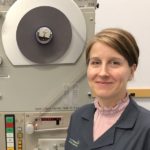 Diana Little
Diana Little
Diana Little has served as Head of Film Preservation at The MediaPreserve, a Division of Preservation Technologies, L.P., since 2010, managing the Film Lab and its team of six preservationists. She oversees all preparation of collection materials, archival scanning, post-production and quality control. She develops preservation plans and selects and maintains equipment, while continuing to work within digital reformatting production.
Diana previously held the position of Senior Preservation Specialist at Cineric, Inc., where she coordinated analog and digital restorations of experimental films, documentaries, and narrative features. She is a graduate of the Selznick School of Film Preservation at George Eastman Museum and holds a B.A. from Vassar College. She consults for the NYWiFT Women’s Film Preservation Fund and is a veteran Home Movie Day host.
 Kendra Long
Kendra Long
Kendra Long is a SLIS student, focusing on archives management. Prior to Simmons, she worked in the film industry as a historical consultant and art department assistant on projects like Chappaquiddick and Black Mass. Once she graduates, she’s hoping to combine her backgrounds in film and research to work as a film archivist, at basically any place that’ll have her. While her background is mostly in digital film, she knows her way around a Bolex, and is always happy to show folks how something works.
 Erica López
Erica López
Erica López is a recent graduate of the NYU Moving Image Archive Preservation Program. Previously employed as a hairstylist, Erica could be found going to punk shows and dancing her heart around Los Angeles until she discovered the world of moving image archiving and was forever changed. During her time in graduate school, she completed internships at Third World Newsreel, California Audiovisual Preservation Project, and Riverside Archives. Erica’s interest in home movies was expressed in her graduate thesis on Latinx home movies. Erica’s study examined a critical National Film Registry work, the Fuentes Family Home Movie Collection at TAMI (Texas Association of the Moving Image), and illustrated how metadata continues to misrepresent marginalized communities. In her continued archiving and preservation work, Erica joined NYU’s APEX (Audiovisual Preservation Exchange) program this past summer in Rio de Janeiro to work with Archive Centro Técnico do Audiovisual – CATV in assessing various at-risk collections, utilizing her preservation passions and bilingual skills. She dreams of being gainfully employed in a positive archival landscape where her Spanish-speaking tatted-up vintage-dress-wearing body can dig through archival material from communities that are considered “less valuable” and ensure that those narratives are here tomorrow.
 Brendan Lucas
Brendan Lucas
Brendan Lucas attended UC Santa Barbara and the Moving Image Archive Studies Program at UCLA. He is currently the Legacy Project Manager for the Outfest UCLA Legacy Project, a joint effort between Outfest and the UCLA Film and Television Archive, where he supports the collection, documentation, preservation and exhibition of LGBTQ moving images. For the past 5 years, Brendan has worked at Deluxe Audio Services (formerly Chace Audio) where he has coordinated and written about audio restoration projects for film and television.
Born and raised in Northern California, he currently lives in Los Angeles, where he is always either interested in–or going to–events in and around his adoptive hometown.
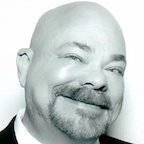 Randal Luckow
Randal Luckow
Randal Luckow is the Director of HBO Archives. Randal holds a BFA in Film and Video Production from UW-Milwaukee, and a MLIS from UW-Madison with a specialization in Archive Administration. Previously, Randal held the role of Managing Archivist at DreamWorks SKG, Digital Archivist at Turner Broadcasting, and Sr. Director of Metadata Services at Turner Broadcasting.
Kristin MacDonough
Kristin is the Time-Based Media Conservation Fellow at the Art Institute of Chicago, where she is in the process of conducting a survey of media artworks in the collections and developing protocols and procedures for their acquisition and preservation. Conveniently, her current job is located across the street from her previous job as the Digitization Specialist at the Video Data Bank. As a member of the Chicago Area Archivists, she also coordinates the Audiovisual Materials Interest Group. Kristin is a 2013 graduate of the Moving Image Archiving and Preservation program, a founding member of XFR Collective, and a past participant of the Audiovisual Preservation Exchange program, Colombia 2014 and Uruguay 2015.
 Janine Marchessault
Janine Marchessault
Janine Marchessault is Professor of Cinema and Media Studies in the Department of Cinema and Media Arts at York University, where she held the Canada Research Chair in Art, Digital Media and Globalization (2003-2013). She was the co-founder of Future Cinema Lab and the inaugural Director of Sensorium: Centre for Digital Arts and Technology Research at York University. In 2012, Professor Marchessault was awarded a prestigious Trudeau Fellowship to pursue her curatorial and public art research around the problem of sustainable development. She has (co)curated numerous large-scale public art exhibitions in Toronto and beyond. She has worked with researchers and curators to uncover some of missing film experiments pioneered at Expo 67. Her co-edited anthologies included Reimagining Cinema: Film at Expo 67 (2014), Cartographies of Place: Navigating the Urban (2014), and forthcoming The Oxford Handbook to Canadian Cinema and Process Cinema: HandMade Film in the Digital Age. Marchessault is the author of ten monographs and (co)edited volumes, and over fifty articles in books, journals and catalogues devoted to cinema, new media, and contemporary art, most recently, Ecstatic Worlds: Media, Utopias, Ecology (2017, MIT Press).
Natasha Margulis
Natasha Margulis is the Political Collections and Access Management Archivist at the Dean B. Ellis Library, at Arkansas State University. She is the digital archivist working on the KAIT-8 TV 16mm News Film Collection, a local television station that was one of the sole independent sources of news for Northeast Arkansas and Southeast Missouri in the 1970s. She has an MLIS in Library and Information Sciences, with a specialization in Archives and Information Sciences from the University of Pittsburgh and a PhD in History from the University of Cincinnati.
_________________________________________________________________________________________________________
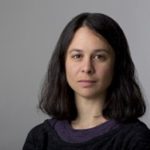 Nicole Martin
Nicole Martin
Nicole Martin is the Senior Manager of Multimedia Archives and Digital Systems at Human Rights Watch. She teaches Digital Preservation as an adjunct professor at New York University’s Moving Image Archiving and Preservation (MIAP) program. She is also a MIAP graduate. Before working at Human Rights Watch, Nicole was the archivist at the daily live television and radio news program, Democracy Now! She received an undergraduate degree in Film and Digital Media from the University of California, Santa Cruz, where she studied early interactive web design, electronic music, and queer film theory
 Taylor McBride
Taylor McBride
Taylor McBride is a Multimedia Specialist for the Smithsonian Institution’s Digital Asset Management System, where she supports DAMS users and workflows with a focus on video and digital preservation as well as SI’s Collections DAMS Integration System, which bridges the DAMS with Collections Information Systems across the Institution. She has been an active member of AMIA since 2010, and has served as Co-Chair of the Small Gauge and Amateur Film Committee since 2012. As co-chair, she has helped the committee to establish regular small gauge educational workshops at the annual conference. Taylor currently serves on the board of the Mid-Atlantic Regional Moving Image Archive (MarMIA). She is a graduate of NYU’s MIAP program.
Mary Miller
Mary Miller is the Peabody Awards Collection Archivist and Metadata Librarian in the Brown Media Archives at the University of Georgia. She has a MLIS from Valdosta State University and an M.Ed. in Instructional Technology from UGA.
 Candace Ming
Candace Ming
Candace Ming is the Project Manager/Archivist of the South Side Home Movie Project. She is a graduate of NYU’s Moving Image Archiving and Preservation program. She interned at MoMA doing crucial research on the newly discovered 1913 footage of Bert Williams. She has a wealth of experience as an archivist (Carnegie Hall Archives, Alaska Film Archives, Missouri History Museum) and as a film projectionist (Landmark Theaters in her native St. Louis). Most recently she managed the huge moving image archive of the New York Police Department. She is responsible for digitizing and preserving all home movies donated to the SSHMP, and also conducts community outreach.
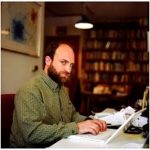 James Mockoski
James Mockoski
James Mockoski received his B.A. in Film/Video from UCSC and graduated with a M.A. in Film Archiving from the University of East Anglia. In 2002, he joined Francis Ford Coppola’s company, American Zoetrope as their Film Archivist and he has supervised the restorations of some classic films such as Apocalypse Now, The Conversation, Tucker and The Cotton Club. He also oversees the Coppola Family Archive of Costumes and memorabilia, including the Museum Collection held at Inglenook Winery and Francis Coppola Winery in Geyserville.
 Meg Monroe
Meg Monroe
Meg Monroe is a graduate student at Simmons University where she studies Library Information Sciences with a concentration in archival management. Her research primarily explores moving image archives and the adult entertainment industry, in addition to film preservation. Meg is currently Vice President of the Simmons University AMIA student chapter, and considers herself a cinephile at heart. Meg was introduced to her love of film through her work as a production assistant, costume designer, and performer for several independent films. She hopes to continue her academic career and receive a PhD in Gender and Sexuality Studies.
 Amy Moorman
Amy Moorman
Amy Moorman is the Archivist for the Wartburg College Archives and the Archives of Iowa Broadcasting (AIB). AIB is a collection of nearly 30,000 audiovisual items related to the development of radio and television broadcasting in Iowa. It includes collections for KWWL, KGAN, WQAD, and KCCI television stations, among others. Amy has over eleven years of experience working with archival materials, including eight years managing audiovisual collections. She has an MA in History from the University of New Hampshire, is a Digital Archives Specialist (since 2016), and a Certified Archivist (since 2012).
 Darrell Myers
Darrell Myers
Darrell Myers is currently the Post Production and Quality Control Specialist for MDPI2 at Indiana University. His day-to-day responsibilities include editing/restoration work on specific titles for film collection holders and general management of the film quality control team and process. Prior, he was at Amazon where he worked primarily on the video team producing, editing and retouching product videos for Amazon.com and affiliates worldwide. Other experiences include Interactive Media Instructor for a career and technical program, live event production, broadcast television, photography, independent and feature film. He is a 1998 Graduate of Indiana University.
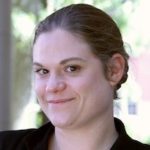 Rielle Navitski
Rielle Navitski
Rielle Navitski is an Assistant Professor in the Department of Theatre and Film Studies at the University of Georgia. Her research takes a comparative approach to Latin American visual culture, with a focus on silent and early sound cinema and a broad interest in how moving images and related forms of print culture forge audiences and shape civic life in Latin American contexts. She is the author of Public Spectacles of Violence: Sensational Cinema and Journalism in Early Twentieth-Century Mexico and Brazil (Duke University Press, 2017) and co-editor with Nicholas Poppe of Cosmopolitan Film Cultures in Latin America, 1896-1960 (Indiana University Press, 2017). She is currently researching a book-length project tentatively titled Transatlantic Spectators: Film Culture Between Latin America and Europe, 1945-1965.
 David Neary
David Neary
David Neary is an audiovisual archivist and curator based in New York, is a graduate of NYU’s Moving Image Archiving and Preservation program, and also holds an MA in Film from University College Dublin. He has worked on film cataloging projects at institutions including The Museum of Modern Art, Lincoln Center for the Performing Arts, and the Oregon Historical Society, and was recently appointed Manager of the Media Preservation Initiative at the Whitney Museum of American Art. His areas of interest and research include nitrate preservation and the archiving of film works with complex projection histories. In addition to his work as a documentary film programmer, he is a seasoned film critic, and currently the Assistant Editor of Cineaste.
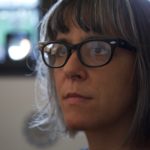 Tara Merenda Nelson
Tara Merenda Nelson
Tara Merenda Nelson is a filmmaker, curator, programmer and lecturer with 15 yearsexperience working with film and digital media. Her graduate studies included workingwith the Harvard Film Archive to inspect and catalog special collections of 16mm films, aswell as creating interactive digital media for WGBH’s Antiques Roadshow. She has taught Digital Media and Video and Film Production courses at Montserrat, Ithaca College, Cornell University and the University of Rochester. Currently she is the Curator of Moving Image Collections at Visual Studies Workshop, where she oversees the inventory,cataloging and digitization of 5,000 16mm films and 6,000 magnetic media titles. She holds an MFA in Film/Video from the Massachusetts College of Art and Design.
 Yvonne Ng
Yvonne Ng
Yvonne Ng is an audiovisual archivist and has been part of the WITNESS team since 2009. In collaboration with WITNESS regional leads, she trains and supports partners on collecting, managing, and preserving video documentation for human rights advocacy and evidence. She develops training resources related to archiving and preservation, such as the groundbreaking Activists’ Guide to Archiving Video. Yvonne also manages WITNESS’s own archive of human rights video. Outside of WITNESS, Yvonne currently serves on the Board of Directors for the Association of Moving Image Archivists (AMIA), on the Advisory Boards of the Memory Lab Network and Documenting the Now, and as a Research Consultant for the Human Rights Investigations Lab at UC Berkeley. She regularly participates in international archiving fora and tweets on archival issues at @ng_yvonne. Prior to joining WITNESS, Yvonne worked as a Research Fellow on the Preserving Digital Public Television Project, and at NYU Libraries, New York Public Library, and the Canadian Filmmakers’ Distribution Centre. Yvonne holds an MA in Moving Image Archiving and Preservation from New York University, where she has also taught a course on Personal Digital Archiving. She holds a BA in Cinema Studies from the University of Toronto.
 Dennis Nyback
Dennis Nyback
Dennis Nyback operates the Dennis Nyback Film Archive. It is comprised of over 13,000 short films, from 1895 onward, mostly in 16mm. It is located in Portland, Oregon. Working from his archive he has created over 300 found footage film programs; that he has shown extensively in Europe, Great Britain, Scandinavia and the United States. He has been a guest at film festivals in: Finland, France, Germany, Iceland, Norway, South Korea, Switzerland, the United States, and other countries. He has owned and operated movie theaters in Seattle, New York and Portland, Oregon.
 Jen O’Leary
Jen O’Leary
Jen O’Leary is the Archive Library Analyst in Archive Operations at NBCUniversal. She graduated from the UCLA MIAS program in 2016 where she was the President of the UCLA AMIA Student Chapter and held internships at the USC Hugh M. Hefner Moving Image Archive, the Wende Museum of the Cold War, and the Academy Film Archive. Jen was also the 2015 recipient of the AMIA Image Permanence Institute Internship. Jen has been a member of AMIA since 2014, and has attended each AMIA Conference since then, as well as numerous Reel Thing and DAS conferences. She has presented posters and been on panels, and has co-planned Student Mixers, meetings, and the Resume Table. She was the AMIA Education Committee Student Liaison from 2015-2017, and has been Co-Chair of the Education Committee since 2017. Jen is also a member of the Advocacy Committee of the Board.
 Gaurav Oberoi
Gaurav Oberoi
Gaurav Oberoi is an Entrepreneur in Residence at the Allen Institute for AI, where he is exploring commercial applications for the latest academic research in AI. His interest in generating hyper-realistic product photos led him to explore the Deepfakes phenomenon, and publish a detailed essay and open source code that was widely read. Gaurav will share his findings with us in the session titled “Everything in Your Archive is Now Fake.” In the past, Gaurav has started and sold two startups (BillMonk, and Precision Polling), worked as an engineer at a large tech giant (Amazon), and founded the Audience business at SurveyMonkey as it grew from 50 to 700 people.
 Christian Gosvig Olesen
Christian Gosvig Olesen
Christian Gosvig Olesen is a Postdoctoral Researcher at the University of Amsterdam’s Media Studies Department. In the research project The Sensory Moving Image Archive (2017-2019), led by Professor of Film Heritage and Digital Film Culture Giovanna Fossati, he is involved in developing a search interface which enables artists, scholars and archivists to source digitised audiovisual collections based on image features such as shape, colour and light. In 2017-2018, he was Principal Investigator in the project MIMEHIST: Annotating Eye’s Jean Desmet Collection funded by the Netherlands Organization for Scientific Research. The project embedded the films, posters and business archive of Eye Filmmuseum’s Desmet Collection in the Dutch digital research infrastructure and annotation environment CLARIAH. In the academic year 2017-2018 Olesen has also been invited by the Eye Filmmuseum as the first researcher in the museum’s new scholar-in-residence program, where he is conducting research on early compilation films on film history.
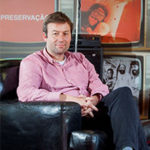 Johan Oomen
Johan Oomen
Johan Oomen (he/him/hers) is head of the R&D department at the Netherlands Institute for Sound and Vision and researcher at the VU University Amsterdam. He is board member of the Europeana Foundation and board member of EUscreen. His research at the VU University zooms in on how active user engagement helps to establish more open, smart and connected cultural heritage. He holds a BA in Information Science and an MA in Media Studies. He has worked for the British Universities Film and Video Council and the RTL Nederland. He has given talks at leading conferences (SXSW, JTS), published numerous articles in journals and is lecturer at the ICCROM training course ‘Sound and Image Collections Conservation’.
 Devin Orgeron
Devin Orgeron
Devin Orgeron is the author of Road Movies, co-editor of Learning With The Lights Off, and professor of Film and Media Studies at NCSU. By the time this is published, he and Melissa Dollman will be caring for a midcentury Polynesian-Modern Alexander ranch home in Palm Springs, California and will be beginning efforts to bring Home Movie Day to that city’s Modernism Week.
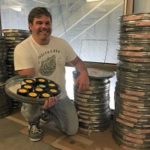 Jeffrey Osmer
Jeffrey Osmer
Jeffrey Osmer came to the Paramount Archive by way of the cutting room. During his freelance days he worked on a number of film and TV projects including such titles as CHAIN REACTION and THE PUBLIC EYE. He moved into a full-time position first at the 20th Century Fox Film Archive, and then onto Hollywood’s most historic film studio Paramount Pictures as an archive librarian. He is a 25-year member of the Motion Picture Editors Guild.
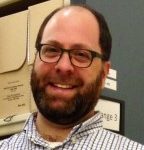 Michael Pahn
Michael Pahn
Michael Pahn is the Head Archivist at the Smithsonian Institution’s National Museum of the American Indian Archive Center, located in the museum’s Cultural Resources Center in Suitland, Maryland. Michael began at NMAI in 2003 as Media Archivist, and has overseen preservation projects funded by the National Film Preservation Foundation, Save America’s Treasures, and the Smithsonian Collections care and Preservation Fund. He has been NMAI’s Head Archivist since 2014, during which time he has overseen major improvements to online access to NMAI’s archival collections. Michael is Vice Chair of the Smithsonian Music Executive Committee and is a past member of the Society of American Archivists’ Native American Archives Section Steering Committee. He has a BA in Anthropology from the University of Pittsburgh and an MLS from the University of Maryland. His prior professional experiences include Save Our Sounds Project Librarian at the Smithsonian Center for Folklife and Cultural Heritage, and Librarian at The Nature Conservancy.
 Kate Papageorge-Schneiderman
Kate Papageorge-Schneiderman
Kate Papageorge-Schneiderman’s main areas of concentration have been works on paper and three-dimensional objects within the archive, although she recently branched out into data librarianship. Her interest in popular culture and studio history, have developed into a career organizing and preserving studio assets. While studying at the UCLA Graduate School of Education and Information Science, Kate held a year-long rare books and archives internship position at UCLA’s Clark Library. She then obtained full-time positions at the studio archives at NBCUniversal and then at Twentieth Century Fox. Kate currently works at the Walt Disney Company cataloging intellectual property and performing data governance as a metadata specialist. As a volunteer at the Bob Baker Marionette Theater, Kate helps organize and preserve the concept art and library book collections and serves in an advisory capacity. She looks at the collection through the lens of her experience serving film and television production teams, whose members need to refer to archival materials as part of the creative process. She is dedicated to preserving the history of creators like Bob Baker, whose influence on the industry is not always widely recognized.
 Brent Phillips
Brent Phillips
Brent Phillips is the Audiovisual Archivist at the Rockefeller Archive Center in Sleepy Hollow, New York, where he preserves film, video, and audio material attendant to the history of the Rockefeller family, their organizations, and other philanthropic institutions such as the Ford Foundation, Asia Society, and the Near East Foundation. He is a 2003 graduate of the L. Jeffrey Selznick School of Film Preservation at the George Eastman Museum. From 2003-2016, Brent worked as the Media Specialist for the Fales Library & Special Collections/New York University. His book “Charles Walters: The Director Who Made Hollywood Dance” was published by University Press of Kentucky in 2014, and Phillips programmed and co-hosted a four-night, thirty film retrospective of Walters’s work for the Turner Classic Movies cable channel.
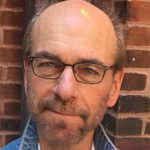 James Pustejovsky
James Pustejovsky
James Pustejovsky is the TJX Feldberg Chair in Computer Science at Brandeis University, where he is also Chair of the Linguistics Program, Chair of the Computational Linguistics MA Program, and Director of the Lab for Linguistics and Computation. He received his B.S. from MIT and his Ph.D. from UMASS at Amherst. He has worked on computational and lexical semantics for 25 years and is chief developer of Generative Lexicon Theory. Since 2002, he has been working on the development of a platform for temporal reasoning in language, called TARSQI (www.tarsqi.org). Pustejovsky is chief architect of TimeML and ISO-TimeML, a recently adopted ISO standard for temporal information in language, as well as ISO-Space, a specification for spatial information in language. He has developed a modeling framework for representing linguistic expressions and interactions as multimodal simulations. This platform, VoxML, enables real-time communication between humans and computers or robots for joint tasks, utilizing speech, gesture, gaze, and action. Recently, he has been working to build a smart archive platform, in order to assist archivists confronted with thousands of hours of digital data in multiple types of media. This platform, called Computational Linguistics Applications for Multimedia Services (CLAMS), is a workflow composition platform, using computational linguistic and computer vision tools to extract information that can be converted to descriptive metadata, for smarter archiving, search, retrieval, and analysis.
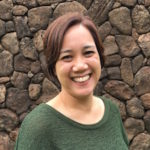 Janel Quirante
Janel Quirante
Janel Quirante is the Head Archivist of ‘Ulu‘ulu: The Henry Ku‘ualoha Giugni Moving Image Archive of Hawai‘i at the University of Hawai‘i – West O‘ahu. She is a Lecturer in Creative Media at UH West O‘ahu and Adjunct Faculty in Library and Information Sciences at UH Mānoa and serves on the Board of Directors of the Hawai‘i Council for the Humanities. Janel earned her BA in Anthropology from the University of California at Berkeley and her Masters in Library and Information Science from UH Mānoa. She worked as a videotape preservation technician at the Bay Area Video Coalition in San Francisco and as the Visual Materials Archivist at the Hoover Institution Archives at Stanford University before joining ‘Ulu‘ulu in 2010.
 Lorena Ramírez-López
Lorena Ramírez-López
Lorena Rameriz-Lopez is a trained audiovisual archivist from New York University’s Moving Image and Archiving Program. Her concentration was on video and digital preservation where she applied her skills in various environments such as museums, libraries, non-profits, and multiple Audiovisual Preservation Exchanges in Uruguay, Argentina, Chile, and Brasil.
 Rene Ramos
Rene Ramos
Rene Ramos is Director of the Miami Dade College Archives and the Lynn and Louis Wolfson II Florida Moving Image Archives (Wolfson Archives) in Miami, Florida. With a background in information technology, Ramos joined the archival community in 2008 to launch projects in preservation, digital assets management, new media development, and imaging and media digitization. Ramos has obtained multiple grants and donations to fund public programming and mass digitization projects for the Wolfson Archives and Miami Dade College Archives collections. He has developed and deployed business and marketing plans to transform the Archives’ holdings into public digital assets, and has developed a wide-ranging series of public programs and community engagement events.
Crystal Rangel
Crystal Rangel is a Specialist II for New York Public Library’s Special Formats Processing department, where she catalogs and processes for preservation the library’s audio and moving image holdings, specifically materials from the Jerome Robbins Dance Division. She also acts as administrator and co-producer of Channel 101 NY, a monthly web series competitive screening. She is a graduate of NYU’s Moving Image Archiving and Preservation M.A. program.
 Felicia Denice Render
Felicia Denice Render
Felicia Denice Render is the Visual Culture Archivist for the Atlanta History Center. She is responsible for managing the visual collections at the History Center, which includes preserving film, video, photographs, architectural drawings, and maps. She earned a Master of Science in Library and Information Science degree from the University of North Texas with a concentration in Digital Content Management. Prior to coming to the Atlanta History Center, Felicia has worked as Project Archivist (Amistad Research Center, New Orleans, LA); Institute of Museum and Library Services (IMLS) Fellow (The HistoryMakers, Chicago, IL); Digital Initiatives Resident Librarian (Atlanta University Center, Robert W. Woodruff Library, Atlanta, GA); and Library Associate (Auburn Avenue Research Library on African American Culture and History, Atlanta, GA). As her work experience indicates, Felicia is passionate about preserving different aspects of culture and the ways technology is used to manage cultural heritage resources.
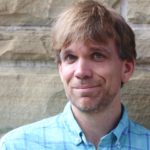 Dave Rice
Dave Rice
Dave Rice is an audiovisual archivist and technologist and a graduate of the L. Jeffrey Selznick School of Film Preservation. Dave’s work focuses on the application of open source technology for audiovisual preservation as well as facilitating coordination and collaboration between communities that preserve media, develop software, and author standards. He has worked as an archivist or archival consultant at media organizations like CUNY, Democracy Now!, The United Nations, WITNESS, DCTV, and Bay Area Video Coalition. Dave also works on developing standards for file formats used in audiovisual preservation, such as Matroska and FFV1, via participation in the Internet Engineering Task Force’s working group on lossless audiovisual formats (cellar). Dave was the 2016 recipient of the National Digital Stewardship Alliance’s Innovation Award and also the 2016 recipient of the Association of Moving Image Archivists’ Alan Stark Award.
 Anne Richardson
Anne Richardson
Anne Richardson is the founding director of Oregon Cartoon Institute, which uses new media, archival film, research, networking, and cross disciplinary discussion to explore Oregon film, animation, and print cartooning history. Working in partnership with museums and other educational non profits, Oregon Cartoon Institute created the Mel Blanc Project, Harry Smith PDX, Mid Century Oregon Genius (celebrating Homer Groening, Harry Smith, James Ivory, James Blue) and the UNDERGROUND USA symposium. She is the author of Notes On James Blue, an online film resource, and directs the annual Oregon Film History Conference. Her MFA is from Columbia University School of the Arts Film Division. She has taught at CUNY, Portland State University, Linfield College, and Northwest Film Center. She is married to independent film archivist Dennis Nyback, who co-founded Oregon Cartoon Institute.
 Sadie Roosa
Sadie Roosa
Sadie Roosa has been part of the WGBH Media Library and Archives team since 2011, and is currently the Technical Project Manager for internal and public-facing websites and repositories, as well at the Metadata Specialist for the American Archive of Public Broadcasting. She is also the President of the Board of Directors of Digital Commonwealth and sits on the PBCore Steering Committee. Sadie holds a Master’s degree in Library and Information Science from the University of Pittsburgh.
 Crystal Sanchez
Crystal Sanchez
Crystal Sanchez is a media archivist at the Smithsonian Institution on the Digital Asset Management team (DAMS), working with digital audiovisual collections from across the Smithsonian’s diverse Museums, Archives, Libraries, Research Centers, and the Zoo. She has Master’s degrees from New York University’s Moving Image Archive and Preservation Program and Florida State University’s Interdisciplinary Humanities with a focus on Media and Museum Studies.
As a moving image archivist, preservation specialist, and arts professional, her work involves collection management and preservation planning of film, video, and digital assets to ensure current and future access. She loves to stroll through fine art museums and to cook.
David Santiago
David Santiago is the Media Coordinator at the Revs Institute, a world-class automotive museum and library in Naples, Florida. He is responsible for the institutional photography and videography of Revs. He manages Revs’ social media accounts and does graphic design for various promotional materials. As a photography professional, he coordinates on digitization efforts and assists with other relevant library projects.
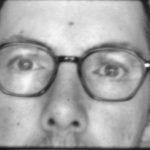 Sean Savage
Sean Savage
Sean Savage is a graduate of NYU’s Moving Image Archiving and Preservation program, and was previously the Programming Director of the Olympia Film Society in Washington State. Subsequently he has worked at Northeast Historic Film and HBO, and has been at the Academy Film Archive since 2008. He is a multiple contributor to The Moving Image journal, and an intermittent presenter at the AMIA conference and Orphan Film Symposium.
 Bonnie Marie Sauer
Bonnie Marie Sauer
Bonnie Marie Sauer, Archivist for the Lincoln Center for the Performing Arts, holds an MLIS with a Certificate in Archives and Records Management from Long Island University’s Palmer School of Library and Information Science and a BA in Sociology from Stony Brook University. She was a member of the 2015 cohort of the Archives Leadership Institute and an adjunct professor for the Archives and Public History Program at New York University. Her career in archives includes working with The Winthrop Group, the National Archives at New York City, and the U.S. Mission to the UN. Prior to becoming an archivist, she worked in museums, public relations, and journalism.
 Angela Saward
Angela Saward
Wellcome Collection has unique and distinctive collections across all media types – its AV collection is one of the largest of its kind. It covers all aspects of medicine, health and welfare throughout the 20th century. Angela Saward, Research Development Specialist (Moving Image & Sound), has been working with the collection since 2005, which has more than doubled in size during this time. From 2009 Wellcome has been digitising its collections, making them freely accessible online under Creative Commons licences. As part of our Research Strategy we are looking at focusing on our collections, building research communities and supporting early career researchers. Attendance at AMIA offers an opportunity to think about building a research community with shared interests and developing interdisciplinary researchers in the field.
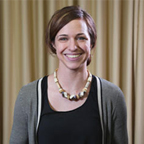 Teague Schneiter
Teague Schneiter
Teague Schneiter is an audiovisual archivist and project manager. She’s a graduate of the University of Amsterdam’s Masters in Preservation and Presentation of the Moving Image. Teague is the founder and Sr. Manager of the Academy Foundation’s Oral History Projects department, which is an initiative that to records, preserves and provides access to video and audio oral history interviews with a diverse array of filmmakers from all over the world. So far the collection she oversees has recorded 188 visual histories with filmmakers from 13 countries in 9 languages, and another 1200 interviews that have been collected and are being digitally preserved, spanning the years of 1948 to the present. She is also the founder of the Moving Image Craft Documentation (MICD) Alliance, a group of 7 allied film organizations (such as the Art Directors Guild, Writers Guild and Cinematographers Guild) who are committed to the development of best practices and resource sharing in the pursuit of documentation of filmmakers. She is also a member of the Oral History Association’s Archives Interest Group, and serves as Vice President of the Association of Moving Image Archivists (AMIA).
 Ariel Schudson
Ariel Schudson
Ariel Schudson (she/her/hers) is a passionate archival activist and independent scholar who has been a member of the film, television and digital media landscape for almost 20 years. A 16mm collector and media theorist, she has written and presented work focusing on gender and media, subcultural dynamics, comic books and fandoms at various academic conferences. Her most recent endeavor is as the founder and podcastress of Archivist’s Alley, a show created to platform those in the archiving/preservation/media-making community who have gone unrecognized due to Rich Straight White Dude power structures. A long time AMIA member, she received her second UCLA graduate degree from the Program Formerly Known as MIAS. The first was from UCLA’s School of Film, TV & Digital Media. She was the Access Committee chair for several years and the AMIA Student Chapter President while at UCLA. A regular contributor for the New Beverly Cinema blog and the website Dangerous Minds, she is currently writing a book about gender representation in Korean television. She has two annoying cats that are the loves of her life (Eartha Kitten and Wallach) and will show you digital imagery (moving and still) of said felines upon request.
Annie Schweikert
Annie Schweikert is an MA candidate at NYU’s Moving Image Archiving and Preservation program. During the program, she has interned in digital audiovisual settings at CUNY TV, the Library of Congress American Folklife Center, and NYU’s Fales Library & Special Collections. Prior to her graduate education, she worked as a project media archivist at the Smithsonian’s Human Studies Film Archives and as a student worker at the Yale Film Study Center.
 Winter Shanck
Winter Shanck
Winter Shanck is the Archivist at WNET. Since joining WNET in 2000, she has collected, catalogued, stored, accessed, and retrieved audiovisual and other materials from the WNET archives, as well as participated in the implementation of the digital archive, determining standards, protocols, and best practices. She holds a Master of Library Science degree from Queens College and has played a key role in all of WNET’s federally-funded and other archival projects over the past 18 years.
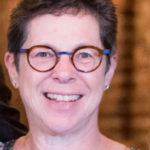 Wendy Shay
Wendy Shay
Wendy Shay, one of AMIA’s founders, spent 35 years as an audiovisual archivist at the Smithsonian Institution’s Human Studies Film Archives and the National Museum of American History Archives Center. She retired in 2017, but continues to be active in the field as an independent researcher, a member of the AMIA election’s committee, and a volunteer at the Human Studies Film Archives and the National Archives’ Film Lab. Wendy is a former president and ardent supporter of AMIA.
 Lee Shoulders
Lee Shoulders
Lee Shoulders is Director of Video Content Development at Getty Images and is responsible for the development and curation of video content at Getty Images. Working closely with a global network of Content Partners such as Sony Pictures, Warner Brothers, Bloomberg, and Smithsonian Institution, Lee drives the direction of new content from partners whether it is news, archive, or creative commercial footage. This direction ensures a constant flow of impactful, engaging and relevant video is provided to Getty Images for licensing to customers globally. Lee started her career at Archive Films in 1992, functioning in the previous roles of sales and research associate, library manager and acquisitions manager. Archive Films was subsequently purchased by Getty Images in 1999. Lee has been very active in the stock footage community for over 20 years and is a founding Board member of ACSIL, the Association of Commercial Image Licensors and has served several terns on the Board of the Association of Moving Image Archivists (AMIA), a non-profit organization focused on the preservation and advancement of moving images. Lee has a Bachelor of Arts from the University of Texas at Austin.

Joe Skinner
Joe Skinner, American Masters Series Media Archivist at WNET, is the producer and project manager of In Their Own Words: The American Masters Digital Archive. He is responsible for assessing the state of the archives’ collection and for managing the cataloging, digitizing, and dissemination of the material, as well as for building relationships with partners to the project. Joe is also the associate producer for the award-winning PBS series American Masters, now celebrating its 32nd broadcast season. He produces the American Masters Podcast, and previously worked as Associate Producer on the 3-part PBS series, Superheroes: A Never-Ending Battle. He holds a BFA in Film and Television from NYU: Tisch School of the Arts.
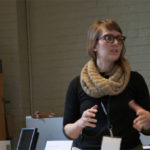 Amy Sloper
Amy Sloper
Amy Sloper is the Film Archivist at the Wisconsin Center for Film and Theater Research in Madison, Wisconsin. Her work involves managing the preservation, cataloging, and access to a diverse collection of over 30,000 moving images on film and video ranging from the collections of Hollywood Studios, directors, actors, writers, and producers; the works of independent and documentary filmmakers; and regional collections of home movies, government films, and industrial films. From 2007-2014, Amy was the Assistant Film Conservator at the Harvard Film Archive, and before that, she worked as a special collections cataloger at the Getty Research Institute in Los Angeles.
Josephine Sporleder
Josephine Sporleder is a Southern Illinois/St. Louis, Missouri based media archivist and film preservationist who since 2015 works for the State Historical Society of Missouri (SHSMO) and formerly for Washington University’s Film & Media Archive and the Missouri History Museum. After spending 9 years in LA specializing in the preservation of motion picture trailers and auxiliary materials, Josephine headed back to the Midwest. As Media Specialist for SHSMO Josephine coordinates oral history programs, audio and video digitization projects, and preserves film whenever possible. Josephine graduated with a BA in film from Webster University and received her certification in film preservation from the L. Jeffrey Selznick School in Rochester, NY. A foster mother to kitties, she has been active in animal rescue for 4 years.
 Rose St. Pierre
Rose St. Pierre
Rose St. Pierre is the Director of Operations for ISAN (International Standard Audiovisual Number) Canada, one of the many Registration Agencies administering the ISAN standard worldwide. ISAN is the global content ID for audiovisual works and their versions.
Rose is also the Media Archives Project Manager for DHX Studios where she has been primarily archiving almost 40 years’ worth of material from the Degrassi television series corporate collection. Previously she was the Library Manager at the Toronto International Film Festival and currently is a member of the Standards Council of Canada Mirror Committee SMC/ISO/TC 46/SC 9 (Identification and Description). She holds an honours BA in Film + Television from the University of Windsor and a Library Information Technician diploma from Seneca College.
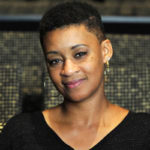 Jacqueline Stewart
Jacqueline Stewart
Jacqueline Stewart is Professor in the Department of Cinema and Media Studies at the University of Chicago. Her research and teaching explore African American film cultures from the origins of the medium to the present, as well as the archiving and preservation of moving images, and “orphan” media histories, including nontheatrical, amateur, and activist film and video. She directs the Southside Home Movie Project and the Cinema 53 screening and discussion series. Jacqueline also Director of the Gray Center for Arts and Inquiry at University Chicago, and is co-curator of the L.A. Rebellion Preservation Project at the UCLA Film and Television Archive. She also serves as an appointee to the National Film Preservation Board. She is currently researching the racial politics of moving image preservation and is also completing a study of the life and work of African American actor/writer/director Spencer Williams.
Stewart is the author of Migrating to the Movies: Cinema and Black Urban Modernity, which has achieved recognition from the Society for Cinema and Media Studies and the Black Caucus of the American Library Association. She is a member of the American Academy of Arts and Sciences, and has been awarded fellowships from the Smithsonian National Museum of African American History and Culture, the Franke Institute for the Humanities at University of Chicago, the Shelby Cullom Davis Center for Historical Studies at Princeton University, and the New York Public Library’s Schomburg Center for Research in Black Culture Scholars-in-Residence Program.
 Dwight Swanson
Dwight Swanson
Dwight Swanson is a founding board member of the Center for Home Movies and a co-creator of Home Movie Day. He produced the home movie compilation feature film “Amateur Night,” and has organized numerous curatorial and archival projects through the Center for Home Movies, including the Home Movie Archives Database, the “Living Room Cinema” DVD, the Home Grown Movies online project and the 2010 Home Movie Digitization and Access Summit. He was also the creator of Cinema Ephemera: The Festival of Useful Film, and was a co-creator of the Medical Film Symposium and the Bastard Film Encounter. He has a B.A. in history from the University of Colorado and an M.A. in American Studies with an emphasis on popular and material culture from the University of Maryland. His initial training was in photographic history and museum studies. Since graduating from the L. Jeffrey Selznick School of Film Preservation at the George Eastman House he has served as the archivist for regional film and video collections at the Alaska Moving Image Preservation Association, Northeast Historic Film and Appalshop, as well as working on projects at the Human Studies Film Archives, the Historical Society of Pennsylvania, and the Canadian Broadcasting Corporation. He is a past member of the National Film Preservation Board, and is past co-chair of AMIA’s Small Gauge and Amateur Film Interest Group and the Regional Audio-Visual Archivists’ Interest Group. He resides in Richmond, Virginia with his wife and two photogenic children.

John Tariot
John Tariot of Film Video Digital works both in the past: preserving motion picture film for a national clientele of archives and film and TV production professionals, and in the future: developing digital strategies for motion picture archives. A futurist with a track-record, John led the advent of the online stock footage economy with the creation of FOOTAGE.net, which included designing and building groundbreaking online databases for NBC News, National Geographic, Paramount Pictures, CNN, and many others. Now, current work is focused on AI’S coming impact on motion picture archiving, some of which will be shared in this session. John’s career also includes serving on the Advisory Committee for Peter Gabriel’s human rights archive WITNESS- and on the Advisory Board for the broadcast-industry bible POST Magazine. He is a member of the Association of Moving Image Archivists (AMIA), the American Film Institute (AFI), and his expertise in color correction and image restoration has been recognized by acceptance to Colorist Society International (CSI), where he is Judging Officer for the 2019 CSI Colorist Awards to be presented at the National Association of Broadcasters in April, 2019.
 Ashley Thomas
Ashley Thomas
Ashley Thomas was introduced to the wonderful world of audiovisual archiving as an audiovisual digitization intern at the John F. Kennedy Presidential Library. Currently, she is in her final year in the dual degree MLIS/MA History program at Simmons University and serves as the AMIA Student Chapter President for the 2018/2019 academic term. Presently, Ashley is the Manuscript End Processing Assistant at the Schlesinger Library at Harvard University, and completing a processing internship at the Harvard Film Archives. Ashley is particularly interested in the preservation challenges of born-digital moving images and media, as well as making archival collections more open, accessible, and usable to the public.
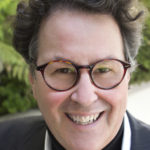 Randall Thropp
Randall Thropp
Randall Thropp began his career at Paramount Pictures in 2003 in the costume rental department. In 2007, the department was closed and he was asked to put together a collection of historical and contemporary costumes – thus establishing a costume archive for the studio. Today, the archive has grown to over 29,000 contemporary costume pieces, 3,500 vintage pieces and 12,500 pieces of jewelry. The Paramount Production Archive has provided exhibition materials for museums and galleries worldwide.
Prior to working at Paramount, Mr. Thropp worked for over 17 years as a Costume Supervisor and assistant designer – most notably on the HBO Television series, Tales From The Crypt and Stephen King’s, The Shining for ABC Television. Mr. Thropp was also one of the original collaborators on the hit off-Broadway show, Tony n’ Tina’s Wedding and the author of numerous children’s plays. He is formerly from Lancaster, Ohio but has spent his adult life in New York and Los Angeles.
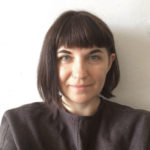 Brianna Toth
Brianna Toth
Brianna Toth is the Assistant Archivist for the Bob Baker Marionette Theater and a graduate student in UCLA’s MLIS program. Her research and studies focus on the restoration and stewardship of moving image artist collections. This dedication to artists and filmmakers extends to exhibition standards and the acquisition of artworks within a fine art context. Brianna’s portfolio research is concerned with the obsolescence of technical expertise within the field of moving image archiving and preservation. She argues that without a platform for the exchange of cross-generational knowledge between AV archivists and technicians, these skills, which are an important part of our cultural heritage, are at risk of being lost. She holds a B.A. in Art History from the University of the Pacific and also studied at Goldsmiths College in London. Brianna has worked for the Conner Family Trust, Estate of George and Mike Kuchar, and digitally preserved the Sequoia Kings Canyon National Park’s videotape collection. She has completed internships for the Producers Library Service and the UCLA Film & Television Archive, and is currently interning at the Getty Research Institute assessing their film holdings.
Laura Treat
Laura Treat is the moving image preservation and outreach librarian at the University of North Texas where she oversees the preservation and digitization of the libraries non-theatrical moving image materials, including the NBC-5/WBAP television news collection. She received two Common Heritage grants from NEH for her media preservation project, “Spotlight on North Texas,” which digitizes and provides access to home movies and other materials related to Texas’ motion picture histories. She earned her MSIS from the University of Texas at Austin, where she worked at the Texas Archive of the Moving Image. Her interests include user-driven and evidence-based description of time-based media and broadening the use of archival moving images as primary sources.
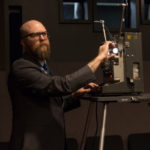 Andy Uhrich
Andy Uhrich
Andy Uhrich is the film archivist at the Indiana University Libraries Moving Image Archive. He is also a PhD candidate at IU where he’s writing a dissertation on film collectors and non-institutional practices of media preservation. Andy has taught a number of classes and workshops on media preservation. He’s worked on restorations projects for IU, Chicago Film Archives and Anthology Film Archives including three films that have been added to the National Film Registry. He’s published articles on restoring a 1904 film and magic lantern performance, the challenges of maintaining early computer art, and the intersection of political documentary and TV advertising. Currently a co-chair of the Association of Moving Image Archivists’ Education Committee, he has previously served on the executive board of the Center for Home Movies.
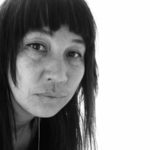 Moriah Ulinskas
Moriah Ulinskas
Moriah Ulinskas is an audiovisual archivist whose work supports collections which fall outside mainstream historical narratives and institutions. From 2011 to 2017 she served as Diversity Chair for the Association of Moving Image Archivists, has been an organizing member of the Community Archiving Workshop since 2012, and was Preservation Program Director at the Bay Area Video Coalition from 2011 to 2014. She is a contributor to the recently published Citizen Internees: A Second Look at Race and Citizenship in Japanese American Internment Camps and is pursuing a PhD in Public History at the UC Santa Barbara and CSU Sacramento.
ATALM Representative (TBA)
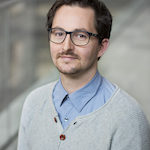 Erwin Verbruggen
Erwin Verbruggen
Erwin Verbruggen is a user studies and digital preservation specialist who works on several (inter)national projects in the field of preservation and open data. Erwin obtained an MA in Preservation and Presentation of the Moving Image at the University of Amsterdam. He interned at the human rights organization WITNESS in Brooklyn, NY and was a film programmer for the Amsterdam-based Open Air Film Festival Pluk de Nacht. He helped set up the Netherlands Institute for Sound and Vision’s film scanning process, and was a scanning operator during the Images for the Future project. At the Research & Development department, he has been a project lead on European collaborative projects, where he co-designed the interactive Na de Bevrijding XL application and became network liaison for the EUscreen Foundation. He is the publishing support for the open access VIEW Journal of European Television History and Culture. Erwin coordinates the annual Winter School for Audiovisual Archiving, is involved in audiovisual archiving toolset development through the PREFORMA and AVEROS projects, and develops web archiving best practices for the award-winning Digital City Revives. Erwin is a member of AMIA’s Open Source Committee, co-chair of the International Outreach Committee, and the Continuing Education Task Force. Erwin has been a guest lecturer at Utrecht University, the University of Amsterdam, the ENCRyM School for Conservation and National University in Mexico City and at the Winter School training sessions.
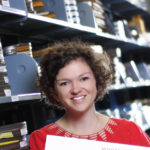 Emily Vinson
Emily Vinson
Emily Vinson is the Audiovisual Archivist and curator of the KUHT and KUHF Collections at the University of Houston Libraries Special Collections. Prior to UH, Emily worked as an archivist at Rice University’s Baker Institute for Public Policy; a project archivist preserving unique audio holdings at New York Public Radio; and a fellow in Preservation Administration at New York Public Library. She holds an MS in Information Studies with a Certificate of Advanced Studies in Preservation Administration from the University of Texas, Austin.

Julia Vytopil
Julia Vytopil works as a Collection Access Manager at the Netherlands Institute for Sound and Vision. After completing her education at the Film Academy in 2003, she worked as production designer, researcher and producer for various audiovisual productions. In 2009 she started working at The Netherlands Institute for Sound and Vision. She worked for various projects with heritage institutions and as policy advisor before she turned to collection access as the main objective in her current position in 2015.
Julia’s hands on experience working in film serves as a source of inspiration in her current job. Her mission is to make heritage collections – and the collection of Sound and Vision in particular – available to as many users as possible, preferably digital. She uses her expertise in the field of digital heritage, open access, international standards and state-of-the-art technology.
 Andrew Weaver
Andrew Weaver
Andrew Weaver is an archivist/libarian who specializes in audiovisual and digital materials. After graduating from the University of Washington with his MLIS, he worked at the UW Libraries Media Center and the CUNY Television Archive as part of the National Digital Stewardship Residency. Currently he is the Digital Infrastructure and Preservation Librarian at Washington State University as well as the ‘Archivist at Large’ for MIPoPS. Andrew is particularly interested in using technology to increase access to collections, integrating AV resources into instruction, Open Source software/workflows/formats and preserving the audiovisual heritage of the Pacific Northwest.
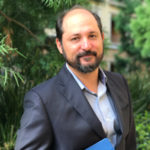 Erik Weaver
Erik Weaver
As Global Director, M&E Strategy & Market Development, Erik Weaver is a specialist focused on the intersection of cloud and the media and entertainment industry, currently running strategy for Western Digital, one of the largest storage companies in the world. Addressing the ever changing and evolving media landscape, he brings deep insights for every stage of the workflow – from object storage and all-Flash arrays to hybrid cloud storage solutions and archive.
Prior to this, he worked on “Production in the Cloud” for the Entertainment Technology Center (ETC) at the University of Southern California, the world-renowned school of Cinematic Arts. This organization is a global project that unites senior leaders from major studios to develop next-generation cloud standards to support global studios of all shapes, sizes, and types, and major cloud vendors to produce proof of concepts and deliver more efficient and productive workflows. The group encompasses many aspects of the cloud, including transport, security, metadata, long-term storage, and formation of an agnostic framework that unites key vendors and studios.
Weaver has fostered and achieved may accomplishments in the M&E market including: executive producer “The Suitcase” CAA people choice award, Tribeca 2017; a project focused on HDR, cloud-based workflows and Live 360; executive producer “Wonder Buffalo” SXSW Interactivity competition; and focused on an HRD first, Cloud, & Volumetric capture, the project brought together by Volumetric capture, Photogrammetry, Ambonisic sound and interactivity. He was also chairman of NAB’s “Next Generation Media Technologies” Conference 2014-2017, as well as chairman of vNAB 2015-2017. He’s also part of the SMPTE C4 MR30 Standards group, which oversees and helps educate the M&E industry on using C4, Semantics and NoSQL for Managing Motion Picture Data. He has also spoken at dozens of M&E conferences and tradeshows.
 Greg Wilsbacher
Greg Wilsbacher
Greg Wilsbacher has been an AMIA member and a faculty librarian at the University of South Carolina since 2004 where he curates the Fox Movietone News Collection and the United States Marine Corps Film Repository. He writes and lectures on newsreel history, digital preservation theory, optical sound technologies and military cinematography and serves as a Board member of the non-profit, Envisioning History. Since 2011, he has led an interdisciplinary team as part of the AEO-light Project (https://usc-imi.github.io/aeo-light/), which has developed an open-source software solution for preserving optical film sound.
 Steve Wilson
Steve Wilson
Steve Wilson is the curator of the film collection at the Harry Ransom Center at the University of Texas at Austin which includes the archives of David O. Selznick, Gloria Swanson, Nicholas Ray, Robert De Niro and many others. In 2014, he organized a major exhibition on Gone with the Wind and wrote the companion book, The Making of Gone with the Wind for the University of Texas Press (2014).
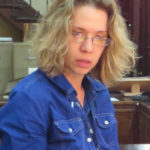 Sandra Yates
Sandra Yates
Sandra Yates, MSIS, CA, DAS is the Archivist & Special Collections Librarian for the Texas Medical Center (TMC) Library, McGovern Historical Center in Houston, TX. She manages the preservation and access to the library’s special collections, including rare books, audiovisual materials, photographs, artwork, institutional records, personal papers, and digital materials. She maintains online resources and service points for the McGovern Historical Center, including server administration, web development, and digital collection storage. She worked in the film and production industry in Houston before receiving her MSIS from the University of Texas at Austin in 2010. She has worked at the TMC Library since 2011, holding previous positions of Instructional Technologies Librarian and Web Services Librarian. She has also worked at Herzstein Library at the San Jacinto Museum of History, Harry Ransom Center at UT Austin, and the Perry-Castañeda Library at UT Austin. She is the 2018 Chair of the Texas Archival Resources Online (TARO) Steering Committee. Sandra is very active in the Association of Moving Image Archivists (AMIA) where her current projects include the Community Archiving Workshop (CAW) and IMLS-funded CAW Training of Trainers project.
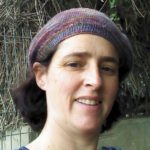 Robin Zalben
Robin Zalben
Robin Zalben is a Librarian at the Steven Spielberg Jewish Film Archive in Jerusalem. She has her Master’s degree in Library and Information Science from the University of Wisconsin-Milwaukee.
 Stefanie Zingl
Stefanie Zingl
Stefanie Zingl is a film archivist at the Austrian Film Museum and the Ludwig Boltzmann Institute for History and Society. Her research interest focuses on non-industrial film practice and amateur culture. Currently she is researching the practices of train model and amateur radio enthusiasts.
